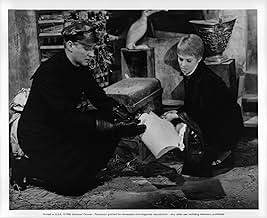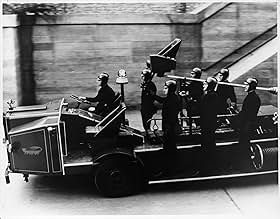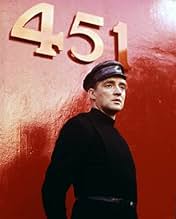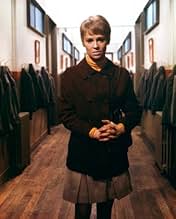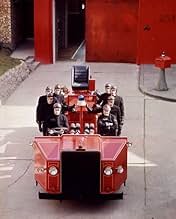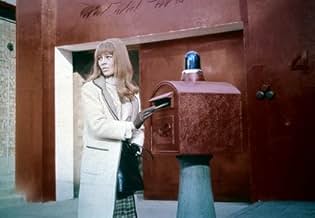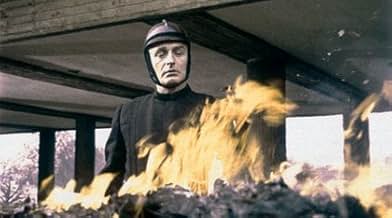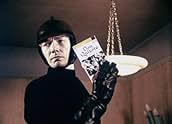IMDb-BEWERTUNG
7,2/10
46.819
IHRE BEWERTUNG
In einer Zukunft voller Unterdrückung beginnt ein Feuerwehrmann, dessen Pflicht die Zerstörung aller Bücher ist, an seiner Aufgabe zu zweifeln.In einer Zukunft voller Unterdrückung beginnt ein Feuerwehrmann, dessen Pflicht die Zerstörung aller Bücher ist, an seiner Aufgabe zu zweifeln.In einer Zukunft voller Unterdrückung beginnt ein Feuerwehrmann, dessen Pflicht die Zerstörung aller Bücher ist, an seiner Aufgabe zu zweifeln.
- Nominiert für 1 BAFTA Award
- 1 Gewinn & 4 Nominierungen insgesamt
Gillian Aldam
- Judoka Woman
- (Nicht genannt)
Michael Balfour
- Book Person: Machiavelli's 'The Prince'
- (Nicht genannt)
Alfie Bass
- Book Person: 'The Prince'
- (Nicht genannt)
Yvonne Blake
- Book Person: 'The Jewish Question'
- (Nicht genannt)
Arthur Cox
- Male Nurse
- (Nicht genannt)
Frank Cox
- Book Person: 'Prejudice'
- (Nicht genannt)
Fred Cox
- Book Person: 'Pride'
- (Nicht genannt)
Noel Davis
- Cousin Midge - TV Personality
- (Nicht genannt)
Judith Drinan
- Book Person - Plato's 'Republic'
- (Nicht genannt)
Kevin Eldon
- Robert - First Schoolboy
- (Nicht genannt)
Empfohlene Bewertungen
From Ray Bradbury's novel about totalitarian society that has banned books and printed words in order to eliminate independent thought; Oskar Werner plays professional book-burner who becomes enraptured with stories. Possibly a bit too thin at this length, but a fascinating peek at a cold future (which the times have just about caught up to). Didn't get a warm reception from critics in its day, yet the performances by Werner and Julie Christie (in a dual role as both Werner's wife and a rebel acquaintance) are top notch. I was never a fan of director François Truffaut's too-precious stories of childhood, but this film, curiously his only English-language picture, is extremely well-directed; the sequence with the woman and her books afire is one amazing set-piece, with tight editing, incredible and precise art direction, and the camera in all the right places. Truffaut lets you feel the agony of book paper curling up black in a mass of orange flames, and the proud defiance of the woman as she herself strikes the match. Unforgettable. *** from ****
Fahrenheit 451" is a strange film, hard to describe. No one could have interpreted the classic Bradbury novel in the same bizarre, fascinating manner as Francois Truffaut. It's a book, and a film, about freedom, choices, individuality, and intellectual repression in a future where books are forbidden; where Firemen are men who start fires...fires in which they burn books.
It was also the first color film directed by Truffaut. Although he by all accounts was not happy about making a color film and found it a bit unsettling, color is used to great effect here; sparingly, except for the extreme shade of red that is seen throughout.
"Fahrenheit 451" is supposed to be the temperature at which book paper catches fire, as the protagonist Guy Montag (Oskar Werner) explains in a scene at the beginning. Guy is a Fireman who seems happy enough with his life until he is approached by a young woman named Clarisse (Julie Christie) on his way home from work one day. She starts up a conversation with him, and the two become friendly. She bewilders him but challenges him to think and feel....and read. And when he arrives home we see his wife (also played by Julie Christie, with long hair), sedated and watching the wallscreen (TV of sorts)...we see what his life is really like, although he had told Clarisse he was "happy"...he is not.
As his friendship with Clarisse grows, he starts to secretly take home, hoard, and read some of the books he finds in the course of his daily work, and as he reads, he becomes obsessed with the books. They become his mistress, and are what finally make him feel affection and warmth. And when he starts to feel and care, so do we.
The two single best scenes are a passionate one involving an old woman who refuses to leave her books, her "children" as she calls them; and the wonderful ending of the film. The countless, painful closeups of books as they are being burned are beautifully done, and difficult to watch.
Truffaut was a well-known disciple of Alfred Hitchcock's films, so when Hitchcock fired his long-time music collaborator Bernard Herrmann during the filming of "Torn Curtain", Truffaut was thrilled to acquire his talents for his own film. The score for "F451" is beautiful, and the film would not be nearly as effective without it.
Writer/producer/director Frank Darabont ("The Green Mile", "The Shawshank Redemption") is working on a new film of "Fahrenheit 451" this year. He says it won't be a remake of the original film.
It was also the first color film directed by Truffaut. Although he by all accounts was not happy about making a color film and found it a bit unsettling, color is used to great effect here; sparingly, except for the extreme shade of red that is seen throughout.
"Fahrenheit 451" is supposed to be the temperature at which book paper catches fire, as the protagonist Guy Montag (Oskar Werner) explains in a scene at the beginning. Guy is a Fireman who seems happy enough with his life until he is approached by a young woman named Clarisse (Julie Christie) on his way home from work one day. She starts up a conversation with him, and the two become friendly. She bewilders him but challenges him to think and feel....and read. And when he arrives home we see his wife (also played by Julie Christie, with long hair), sedated and watching the wallscreen (TV of sorts)...we see what his life is really like, although he had told Clarisse he was "happy"...he is not.
As his friendship with Clarisse grows, he starts to secretly take home, hoard, and read some of the books he finds in the course of his daily work, and as he reads, he becomes obsessed with the books. They become his mistress, and are what finally make him feel affection and warmth. And when he starts to feel and care, so do we.
The two single best scenes are a passionate one involving an old woman who refuses to leave her books, her "children" as she calls them; and the wonderful ending of the film. The countless, painful closeups of books as they are being burned are beautifully done, and difficult to watch.
Truffaut was a well-known disciple of Alfred Hitchcock's films, so when Hitchcock fired his long-time music collaborator Bernard Herrmann during the filming of "Torn Curtain", Truffaut was thrilled to acquire his talents for his own film. The score for "F451" is beautiful, and the film would not be nearly as effective without it.
Writer/producer/director Frank Darabont ("The Green Mile", "The Shawshank Redemption") is working on a new film of "Fahrenheit 451" this year. He says it won't be a remake of the original film.
A film about the deliberate dumbing down and control of the populace using information control is perhaps more relevant than ever but Fahrenheit 451 also shows it's age in many parts and the conclusion doesn't feel right to my sensibilities.
Even so it's a story worth knowing and still an effective - though at times glacially paced - film.
The acting is passable. It follows the rather stilted form common at the time but it still conveys the story well and since the characters are supposed to be emotionless and controlled it's also fairly effective.
All in all I would recommend anyone to see it. It's not as impactful as 1984 but still a classic story that should be remembered.
Even so it's a story worth knowing and still an effective - though at times glacially paced - film.
The acting is passable. It follows the rather stilted form common at the time but it still conveys the story well and since the characters are supposed to be emotionless and controlled it's also fairly effective.
All in all I would recommend anyone to see it. It's not as impactful as 1984 but still a classic story that should be remembered.
The Firemen take the knowledge, they won't permit, those with power make the rules, it's their remit, books are burned and turned to ash, as sparking kerosene arcs flash, if you're caught with contraband, they will commit. Montag works the fire, erasing texts, since meeting Clarisse he's increasingly perplexed, she's opened up a door, that's taken him to hidden floors, now he knows the flames he throws are all pretext.
It's not the greatest piece of filmmaking you've ever seen, and you can pull a wagon through some of the holes in the logic, but for its time, and as an example of how the few can control the many, it's still worth an exploration to benchmark where the world is all these years later.
It's not the greatest piece of filmmaking you've ever seen, and you can pull a wagon through some of the holes in the logic, but for its time, and as an example of how the few can control the many, it's still worth an exploration to benchmark where the world is all these years later.
Perhaps one of the greatest science fiction writers of all time is Ray Bradbury. He was able to look at so many different fantastical things from so many different fantastical angles. Many credit his novel Fahrenheit 451 has his greatest work. It is a book that depicts a future where learning is oppressed and conformity is expected. Government rules with no one ever questioning it. The masses are swayed by what the government wants them to see through television and pills. This adaptation of Bradbury's novel by French auteur Francois Truffault is effective in retaining the heart of Bradbury's work. Oskar Werner plays Guy Montag, a fireman who burns books rather than puts fires out. He is an expert in his field. He can find all the neat, out-of-the-way places people hide their books like in toasters or behind TV picture tubes. Books are outlawed as seen as corrupting forces in society. Only picture books are allowed. Montag goes on with his mundane life with his wife who is always watching television. The status of one is determined by how many TVs you have in the house. Montag doesn't like TV and has an undeniable quench for something more. Anyway, he meets a neighbor like him in spirit and soon decides to start reading. I loved this film because its message is so very clear today and so scary as we live in a society very different from Montag's yet not so far away. TV dominates our lives to some degree. Most of our news comes from it. Much of our bias comes from it. It is definitely a defining instrument in our lives whether or not we wish to admit it. Reading some argue is in a massive decline and our standards as a society certainly have much lower expectations as to what people should know. If you doubt this, just look at a show from the 1960s(even a show like Bewitched or Gilligan's Island) and compare the vocabulary to something made for a similarly aged viewing audience. We dumb down everything. Anyway enough sermonizing, Farenheit 451 will get your mind thinking. Truffault creates plenty of suspense and a wonderfully eerie new future. His use of color in particular really impressed me. It is of course the 60s, but he makes his world look very different. The acting is very good. Werner gives a more than competent performance as a man troubled with a life he finds to be false. Julie Christie excels playing BOTH Werner's wife and the neighbor girl that inspires him to find the true self. I also enjoyed a rare turn by crusty Cyril Cusak! This is indeed an underrated science fiction film and more importantly a film that should be explored as we move closer and closer to that society it showcases. Fortunately for all of us here, we understand the power, the joy, the fulfillment that reading and writing bring us each day. One last note(or two): this was Truffault's first film in English(may be his only one?) and the ending was wonderfully done!
Wusstest du schon
- WissenswertesThe film's credits are spoken, not read, in keeping with the film's theme of destruction of reading material.
- PatzerAfter Montag comes out of the first raid to burn the books, the placement of the fire protective clothing (helmet and gloves) are unnatural movements and appear to be a reverse run of film footage. This is further compounded by the fact that he walks backwards to get the flamethrower which has flame entering the nozzle instead of leaving the nozzle.
- Zitate
Guy Montag: To learn how to find, one must first learn how to hide.
- Crazy CreditsThe beginning credits are spoken instead of written on the screen.
- Alternative VersionenOriginally Noel Davis (who plays Cousin Midge) did the opening voice over. In the current version it is done by Alex Scott ("The Life of Henry Brulard" Book Person).
Top-Auswahl
Melde dich zum Bewerten an und greife auf die Watchlist für personalisierte Empfehlungen zu.
- How long is Fahrenheit 451?Powered by Alexa
Details
- Erscheinungsdatum
- Herkunftsland
- Offizielle Standorte
- Sprachen
- Auch bekannt als
- Farenhajt 451
- Drehorte
- Produktionsfirmen
- Weitere beteiligte Unternehmen bei IMDbPro anzeigen
Box Office
- Budget
- 1.500.000 $ (geschätzt)
- Bruttoertrag in den USA und Kanada
- 509 $
- Eröffnungswochenende in den USA und in Kanada
- 11.206 $
- 25. Apr. 1999
- Weltweiter Bruttoertrag
- 581 $
- Laufzeit
- 1 Std. 52 Min.(112 min)
- Seitenverhältnis
- 1.66 : 1
Zu dieser Seite beitragen
Bearbeitung vorschlagen oder fehlenden Inhalt hinzufügen


